The Network Virtualization Journey So Far
Communications Service Providers (CSPs) are accelerating the migration of key services and business capabilities to the cloud. Pressure on margins and costs is forcing CSPs to innovate to deliver the complex, customizable services that advanced enterprise customers are looking for.
A number of these initiatives fall under the umbrella of ‘telco cloud.’ CSPs are looking to take existing network functions that are traditionally hardware-based (5G functions, routers, etc.), and virtualize them using public, private, and/or mixed cloud infrastructure, transforming the cost structure and enabling greater agility.
So far, shifting to the cloud has not yet delivered its expected benefits. Virtualization and containerization have added new overhead for resources and infrastructure, preventing the agility that the new services require. Today, service providers face a challenge: successfully implementing end-to-end orchestration across all layers of the telco cloud, from the hardware, networking, cloud, network function and service layers. This will require a solution that’s built for complex, multi-vendor, multi-layer infrastructure.
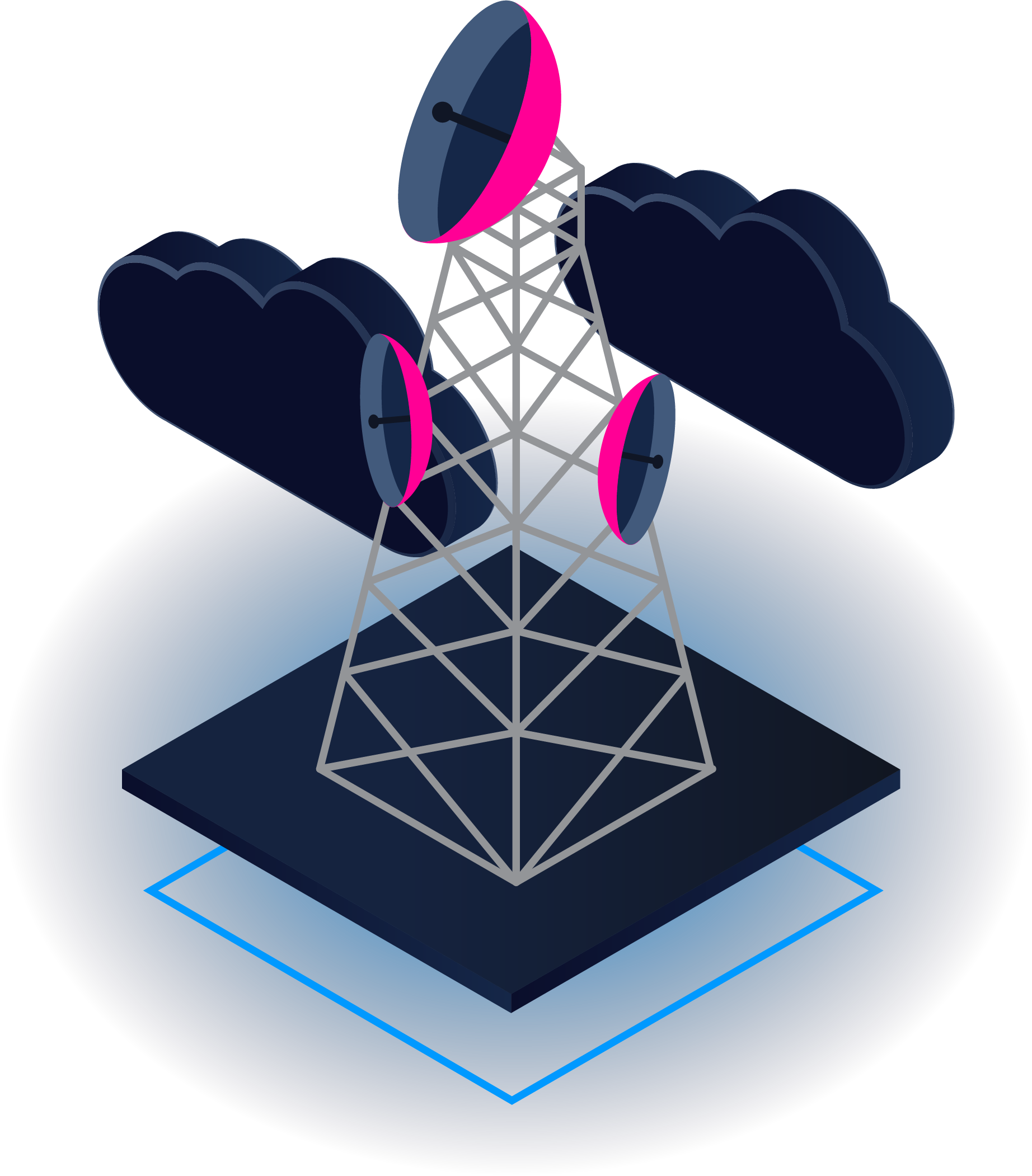
Multi-Layer Network Orchestration for Telco Cloud
Telcos have recognized the need for orchestration within individual network domains, but there are significant efficiency gains to find in multi-layer orchestration as well.
Using the deployment of edge data centers as an example, telcos today rely on either multiple tools or custom development to orchestrate the process top to bottom. From orchestrating network switch fabric, to configuring hardware via a bare metal controller, to installing Kubernetes or OpenStack and communicating with that orchestrator, to pushing network functions, to configuring network functions — and all of this to get to the equivalent point of plugging something in. For virtualization to drive efficiency, this process must be accelerated.
Orchestrating across every layer, domain, and vendor with a central platform is the key to unlocking telco cloud ROI. Success depends on the ability to efficiently leverage all infrastructure and integrate with every environment. With the right solution, telcos will cut resource costs while accelerating creation and delivery of innovative products to sell to customers.
Outcomes
Optimize Hardware Utilization
Size resources dynamically and move away from vendor-dictated, vertically integrated stacks to avoid paying for unutilized hardware.
Improve Infrastructure & Vendor Flexibility
Switch vendors at any layer easily, avoid lock-in, and lessen reliance on hardware vendors.
Accelerate Service Composition
Reduce time and manual effort for infrastructure creation and service activations.
Accelerate Product Creation & Delivery
Expose even the most complex network services with standard APIs so they can easily be rolled into packaged products and sold.
Implementing Telco Cloud with Itential
Itential is uniquely designed to solve the integration problem in network and IT infrastructure. Our platform orchestrates all layers of a cloud-native service, from the physical network components to the productization and delivery of the service. Other orchestration solutions in the service provider space have historically focused on a single layer or network domain.
Because Itential is designed with a dynamic, flexible data model and an API-driven integration system, orchestrating at every layer is as easy as orchestrating any single layer. The platform is designed to make adapting to new technologies and new vendors as efficient as possible.
CSPs can use Itential’s technology to accelerate network virtualization initiatives, maximize the value of network infrastructure, save costs, and generate new revenue by delivering new products more quickly.
 Edge Deployments
Edge Deployments
Orchestration of deployment of 5G network functions to edge data centers.
 Global Networking
Global Networking
Seamless global network orchestration across IP, cloud and interconnect networks.
 Telco Cloud Services
Telco Cloud Services
Orchestration of security, DNS, and load balancing services in telco cloud data centers.
Multi-Layer Orchestration Capabilities
In many environments, there are orchestrators or controllers at each layer. Basic infrastructure is orchestrated by underlay controllers and cloud management systems. Tenant network functions are orchestrated and managed by NFV controllers, overlays are managed by overlay controllers, and services are orchestrated by service orchestrators or service order managers.
Creation of new systems requires interactions with all of these individual layers. Today, CSPs are using orchestrators to manage within the pieces, but the handoffs between layers of the end-to-end process are facilitated by tickets or other hard handoffs. With Itential, these manual handoffs can be fully orchestrated, removing any of the delays associated with the existing approach.
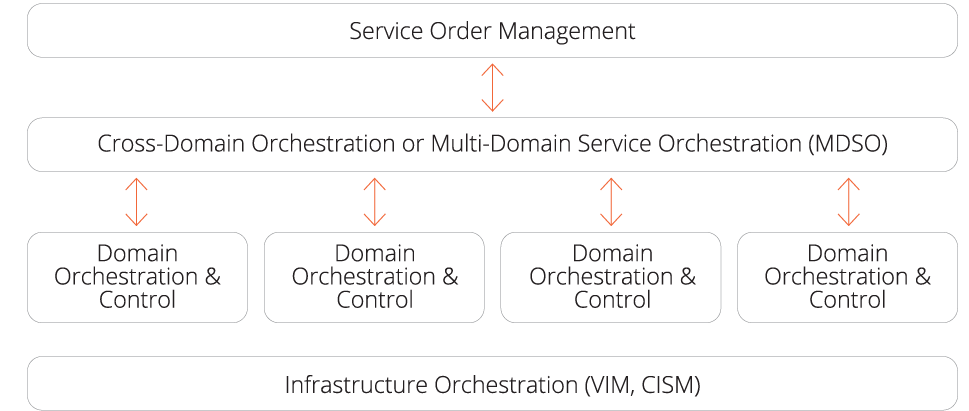
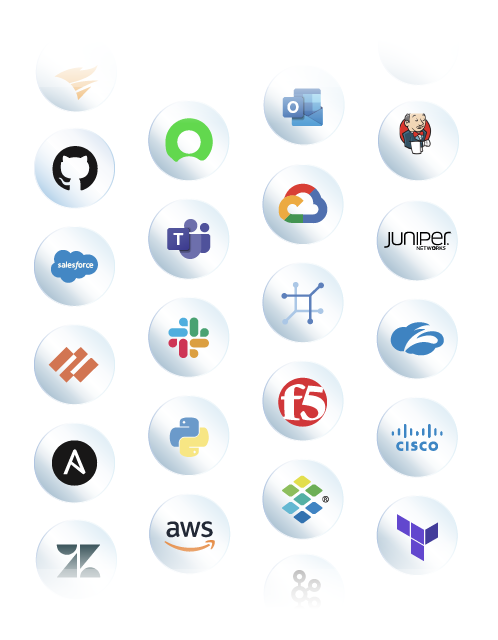
API-Driven, Vendor-Agnostic Integration Model
This flexibility is enabled by several core capabilities of the Itential platform. The platform doesn’t force technologies to conform to a pre-defined, rigid data model — instead, it uses APIs to integrate with any system, tool, or platform, and it leverages JSON to model all payloads and transform data between API calls, creating a virtual mapping between systems, networks, and data structures.
CSPs can adopt any new vendor or expand to any new domain and immediately incorporate it into an orchestrated Itential workflow at no additional cost.
Rapid, Centralized, Low-Code Orchestration
Itential’s low-code workflow canvas enables rapid creation of end-to-end network orchestrations across multi-vendor, hybrid, and multi-cloud infrastructure. CSP teams can orchestrate any process quickly and easily, accelerating time to value.
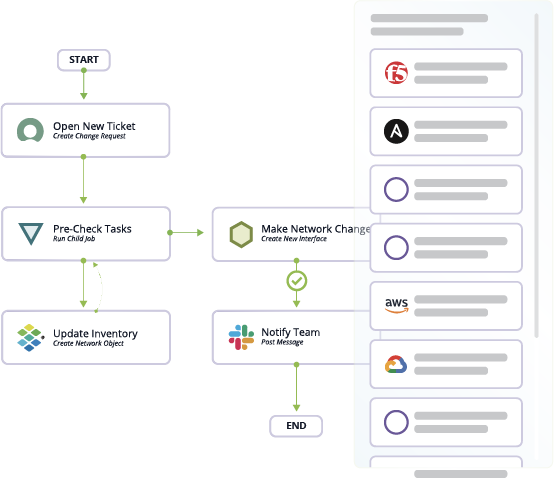
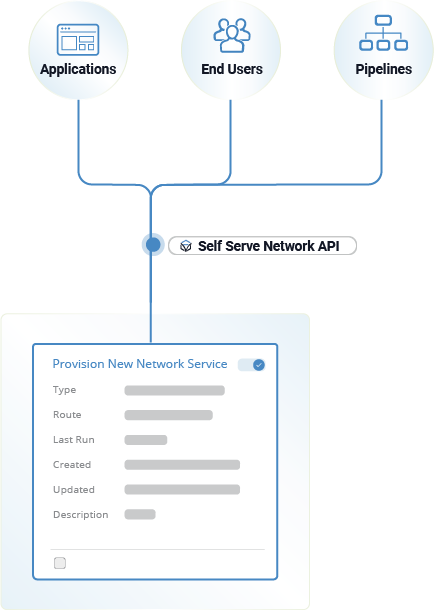
Northbound API Exposure for Streamlined Service Delivery
Composing services using distributed cloud infrastructure is only half the battle. Itential’s platform allows CSPs to expose any service with standard APIs so it can be delivered as a product, through ServiceNow, through internal customer portals, etc.
Frequently Asked Questions
What does “telco cloud” mean in practice?
It’s the virtualization of network functions that were traditionally hardware-based (like 5G core, routing, or firewalling) into cloud-native services running across public, private, and hybrid cloud. This transformation aims to cut costs, increase agility, and accelerate service delivery.
What challenges are CSPs facing in telco cloud adoption?
Many telcos have virtualized functions, but containerization and multi-layer complexity often create new overhead. Without orchestration across hardware, networking, cloud, and services, the agility and cost savings are limited.
How does Itential help with multi-layer orchestration?
Itential orchestrates across all telco cloud layers — physical hardware, underlay/overlay networks, virtualization platforms (e.g., Kubernetes, OpenStack), network functions (VNFs, CNFs), and service layers, so services can be deployed end-to-end instead of stitched together manually.
Why is multi-layer orchestration better than domain-specific orchestration?
Domain-specific orchestration automates within silos, but still requires manual coordination between layers. Multi-layer orchestration eliminates these handoffs, reducing errors and accelerating edge deployments, service rollouts, and upgrades.
How does Itential avoid vendor lock-in in telco environments?
The platform is vendor-agnostic, integrating with diverse network controllers, cloud APIs, and NFV/CNF managers. This lets CSPs adopt new vendors or technologies without re-architecting orchestration.
Can Itential support 5G and edge use cases?
Yes. Itential helps orchestrate the provisioning and lifecycle of edge data centers, 5G core functions, and related connectivity services across distributed cloud environments.
How does Itential improve time-to-market for telco services?
By automating provisioning, validation, and service activation across layers, Itential reduces rollout time from months to weeks, enabling faster launch of enterprise services like private 5G, SD-WAN, and secure edge connectivity.
How does the platform handle compliance and audit requirements in telco cloud?
Every change across layers is logged with traceability. Policies and golden configs ensure compliance with regulatory and SLA requirements, while rollback and remediation workflows reduce risk.
What ROI can telcos expect?
Typical benefits include 50–70% reduction in service deployment times, fewer manual errors, and significant opex savings by consolidating orchestration across vendors and domains.
- Itential + Juniper: Orchestrating the Deployment of 5G Edge
- How Enterprises Can Embrace the Full Power of 5G Networking Through Automation
- 4 Crucial Principles for Successful Implementation of 5G Network Slicing
- Accelerate 5G Impact with Itential’s IP Backhaul Automation Solution
- How IP Backhaul Automation Drives Business Impact for Communications Service Providers
- Key Automation Use Cases to Support the Evolution of IP Backhaul Networks
- Shifting from Single Domain Automation to Multi-Domain Orchestration
- The 3 Components Needed for Automating IP Backhaul Networks
- What Communications Service Providers Can Learn from Early Network Automation & Orchestration Initiatives
- Accelerating 5G Impact Through Cell Site Backhaul Automation with Itential
- Automated 5G Network Slicing for Interconnection of 5G Core, Edge, & Multi-Cloud with Itential
- Tier 1 Telco Accelerates 5G Deployments through Backhaul Automation with Itential
- Automate & Orchestrate Communications Service Provider Networks with Itential
- Automation: The Key to Successful 5G
- Multi-Domain Service Orchestration for Service Provider Networks with Itential
- Dynamic Edge Enabled Application Automation (TMF)
- Juniper Cloud Native Router (JCNR) Automated Deployment & Provisioning with Itential Cloud


